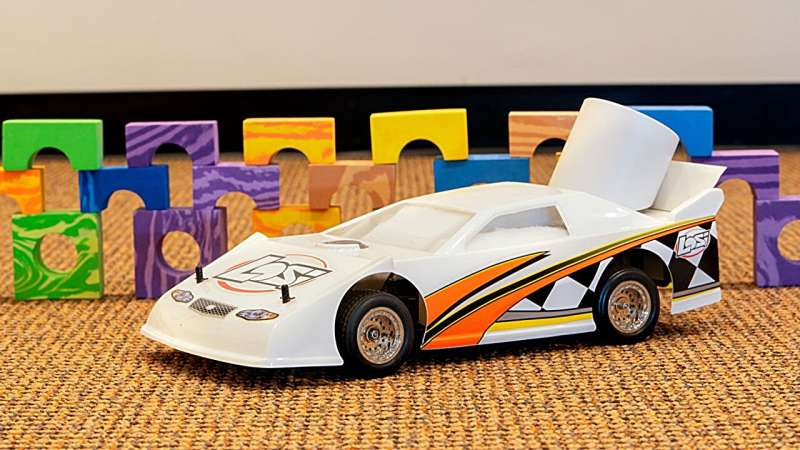This article has been reviewed according to Science X's editorial process and policies. Editors have highlighted the following attributes while ensuring the content's credibility:
fact-checked
trusted source
proofread
Timely responses—even from a car—drive babies' learning

The timing of others' reactions to their babbling is key to how babies begin learning language and social norms—a process evident in infants' interactions with a robot, new Cornell research shows.
Deploying a remote-controlled car that would approach and produce speech sounds in response to babbling, researchers found that within 10 minutes, babies formed strong expectations that the car would respond to their vocalizations. When it stopped doing so, the babies erupted in bursts of babbling and play directed at the car—a stronger reaction than when they were communicating with people.
The study shows that in early development, foundational learning about where to direct one's attention hinges on "contingency"—caregivers' responses close in time to the baby's behavior, the researchers say. At least in the first year, they suggest, babies are highly "plastic," or flexible, in what they will learn from contingently, even including machines that lack human features.
That finding counters assumptions by some developmental psychologists that babies, like other slowly developing (altricial) animals, rely on built-in, genetically based knowledge, such as face recognition, to learn, said Michael Goldstein, professor in the Department of Psychology and the College of Arts and Sciences.
"We're showing the opposite," said Goldstein, director of the Behavioral Analysis of Beginning Years (B.A.B.Y.) Laboratory. "What's built into the baby is to pay attention to timing, and the world takes care of the rest. Babies are learning machines, and it's on the adults to be responsive in the right ways to drive that learning."
Goldstein is the corresponding author of "Contingency Enables the Formation of Social Expectations About an Artificial Agent," published July 25 in the journal Infancy. The first author is Julia Venditti, a doctoral student in the field of developmental psychology.
Co-authors are Jennifer Schwade, former research associate in the Department of Psychology, and several former undergraduates who contributed to the work in honors theses: Dr. Rachel Elkin '11, assistant professor of pediatrics in emergency medicine at Columbia University Irving Medical Center; Rondeline Williams '17, a doctoral candidate in developmental psychology at Stanford University; and Angela Narayan '07, associate professor of psychology at the University of Denver.
Prior B.A.B.Y. Lab research has shown that caregivers are highly sensitive to babies' babbling, responding 50% to 60% of the time, on average. Babies pick up patterns during those exchanges—for example, uttering more vowel or consonant sounds as the adult does. That prompts further caregiver response, creating a feedback loop that facilitates learning.
To disentangle the importance of timing in that process from caregivers' human traits, Goldstein and collaborators introduced an artificial social partner, something with which the babies had no prior experience: the remote-controlled car.
More than 60 babies, ages 7 and 8 months, were placed (with caregivers present) in a large playroom with either the car or a person they didn't know. For some infants, the car or person responded when they babbled—contingently—at the same rate their caregiver would. The car would roll forward and emit a vowel sound from an attached speaker, while the unfamiliar person would make a similar sound, touch the baby's shoulder and smile. For other groups, the car or person responded on a random schedule not triggered by the baby's vocalizations, known as a yoked control.
After 10 minutes of social interaction, the car or person stopped responding for two minutes. That prompted the babies in each group to became more vocal—but none more than the ones playing with the car that was responsive to them.
"When that contingent car stopped responding, the babies grabbed the car, moved the car, they babbled like crazy at it," said Goldstein.
In addition to that behavior, called an "extinction burst," those infants' attention was directed mostly at the car, while others looked more to their caregiver.
The researchers suspect the plasticity the babies exhibited, which starts at around five months, is an advantage while they are learning how to learn—but may fade as they gain language proficiency. The same experiment probably would not work with 2-year-olds, Goldstein said. But the findings may offer insight into foundational learning mechanisms, something Goldstein's lab is beginning to study in babies at risk for autism, who might prefer more predictable response rates than typically developing babies.
"People are highly structured in their reactions to babies' babbling, and maybe that's all babies need to start learning," Goldstein said. "Rather than preexisting knowledge of how other people act, you can build something into the babies that's much simpler: a contingency detector."
More information: Julia A. Venditti et al, Contingency enables the formation of social expectations about an artificial agent, Infancy (2024). DOI: 10.1111/infa.12614



















